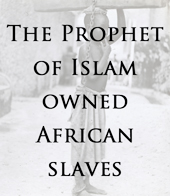TheReligionofPeace
|
|
TROP is a non-political, fact-based site which examines
the ideological threat that Islam poses to human dignity and freedom
|
|
|
Jihad Report
Jan 31, 2026 -
Feb 06, 2026
|
| Attacks |
29
|
| Killed |
337
|
| Injured |
193
|
| Suicide Blasts |
3
|
| Countries |
7
|
|

|
Jihad Report
January, 2026
|
| Attacks |
157
|
| Killed |
661
|
| Injured |
420
|
| Suicide Blasts |
4
|
| Countries |
18
|
|
List of Attacks
|
|
|
It's much easier to act as if critics of Islam have a problem with Muslims as people than
it is to accept the uncomfortable truth that Islam is different
|
|
|
|

|

|
|
|

What can we learn about
Islam from this woman?
|
|
|
|





